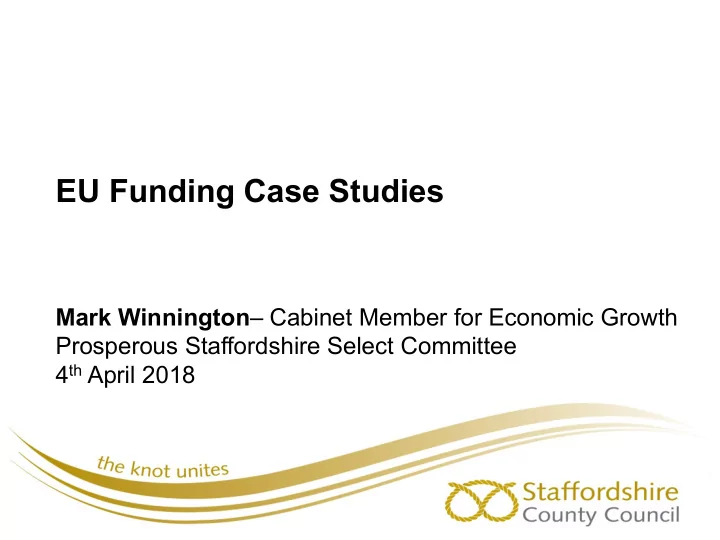

EU Funding Case Studies Mark Winnington – Cabinet Member for Economic Growth Prosperous Staffordshire Select Committee 4 th April 2018
EU Funding Programme Performance as @ March 2018 All SSLEP EU funds commitment as @ March 2018 (£m) Balance of grant to EU Fund Total Allocation Total grant committed allocate ERDF 78.45 63.09 15.36 ESF 55.00 37.13 17.87 EAFRD 3.13 1.31 1.82 LEADER 1.84 0.75 1.09 TOTAL ESIF FUNDS 138.42 102.28 36.14
EU Funding Case Study 1 Keele Smart Innovation Hub • Transformational project focused on technological growth and innovation • Cornerstone of Keele deal • 3 key elements – Business Hub – advice/support – Commercial incubation space (IC6) – Academic facilities (Keele Business Management School) • Total investment value £16.2m ERDF contribution £9.7m • Construction starts Spring 2018
EU Funding Case Study 2 • Single point of contact for business support Staffordshire Brewery Ltd, Cheddleton • 4 key elements – Helpline 0300 111 8002 – Business advisors – Events/ Workshops – Small business grant scheme (grants up to £10,000) • Progress to date – 6077 businesses assisted – 1572 individuals provided with start- up support – 771 manufacturing businesses assisted – 859 business diagnostics undertaken – 300 small business grants awarded – 8731 contacts through the Business Helpline • £10,000 Growth Hub grant – 9279 signposts and 7538 referrals made to • Helped towards the cost of a semi-automatic business support including finance de-palletiser and an accumulation bench • Total investment £2.7m Created 2 new jobs • ERDF contribution £1.6m • In delivery until June 2019 (to be extended to 2022)
EU Funding Case Study 3 • Helping businesses become energy efficient Valley Northern, Stafford and reduce their carbon footprint Sector: Supplier to UK Health Industry • 3 key elements LCBEP support: FREE Energy Review and Grant – Energy audit LCBEP Grant: £10,000 – Energy efficiency plan saving: 13.7 tonnes of CO 2 / £3,000 per year – Small grant scheme up to £20,000 After Lighting Before Lighting • Performance to date – Carried out 53 Audits – 16 grants awarded totalling over £100,000 – Business have saved 142.6 tonnes of CO 2 • Total investment value £1.1m ERDF contribution £0.7m • In delivery until December 2018 (to be extended to 2021
Factors affecting success in accessing EU funded business support grants All enquiries from businesses are screened/ filtered before applications for grants are submitted and therefore the majority of applications are successful. All applications must • Comply with strict eligibility criteria – Geography (urban, rural, SSLEP area) – Purpose of the grant – Eligible sectors (i.e. retail not eligible) • Align with growth priorities of SCC and LEP • Have a strong and sustainable business case with tangible outcomes i.e. job creation • Subject to stringent and invasive due diligence procedures involving financial performance and company history checks • Operate within State Aid limitations i.e. De Minimis allows up to € 200,000 (£170,000) in any three year period • Comply with strict conditions of grant i.e. open procurement, audits and inspection regimes Other reasons • Challenging application process • Length of time to process applications • Business changing their growth priorities • Impact on business finances ie Having to pay business rates for change of use
Recommend
More recommend